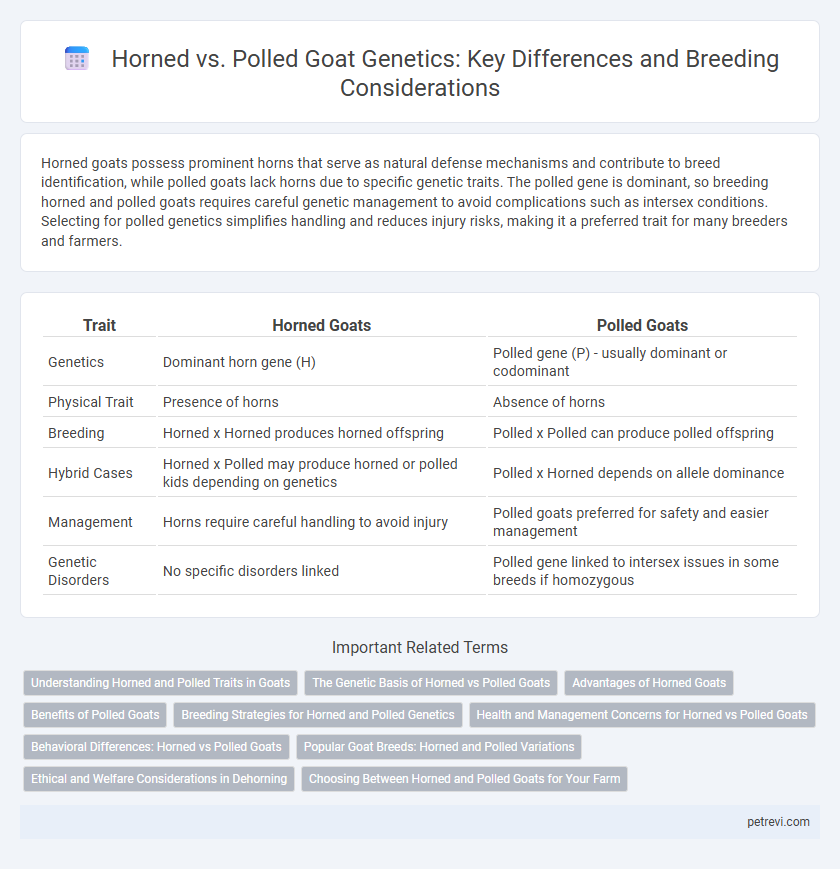Horned goats possess prominent horns that serve as natural defense mechanisms and contribute to breed identification, while polled goats lack horns due to specific genetic traits. The polled gene is dominant, so breeding horned and polled goats requires careful genetic management to avoid complications such as intersex conditions. Selecting for polled genetics simplifies handling and reduces injury risks, making it a preferred trait for many breeders and farmers.
Table of Comparison
| Trait | Horned Goats | Polled Goats |
|---|---|---|
| Genetics | Dominant horn gene (H) | Polled gene (P) - usually dominant or codominant |
| Physical Trait | Presence of horns | Absence of horns |
| Breeding | Horned x Horned produces horned offspring | Polled x Polled can produce polled offspring |
| Hybrid Cases | Horned x Polled may produce horned or polled kids depending on genetics | Polled x Horned depends on allele dominance |
| Management | Horns require careful handling to avoid injury | Polled goats preferred for safety and easier management |
| Genetic Disorders | No specific disorders linked | Polled gene linked to intersex issues in some breeds if homozygous |
Understanding Horned and Polled Traits in Goats
Horned goats possess a dominant gene that promotes horn growth, while polled goats carry a recessive gene resulting in the absence of horns. Breeders focus on these genetic markers to predict and select desired traits, as polledness is often preferred for safety and management reasons. Understanding the inheritance patterns of horned and polled traits aids in effective breeding strategies and herd management.
The Genetic Basis of Horned vs Polled Goats
The genetic basis of horned versus polled goats hinges on the presence of the polled allele, which is typically dominant and results in hornless offspring when inherited in homozygous or heterozygous form. Research identifies the polled locus on caprine chromosome 1, where mutations or deletions in regulatory genes influence horn development, distinguishing horned goats with the recessive homozygous genotype. Understanding these genetic markers aids breeders in predicting horn phenotypes and managing traits linked to animal welfare and breed standards.
Advantages of Horned Goats
Horned goats exhibit natural defense capabilities, enhancing protection against predators and reducing reliance on human intervention. Their horns contribute to thermoregulation by dissipating body heat, which supports better adaptability in hot climates. Breeders may also use horn characteristics as genetic markers for lineage and breed identification, aiding in selective breeding programs.
Benefits of Polled Goats
Polled goats, genetically bred without horns, offer significant benefits including reduced risk of injury to other goats and handlers, enhancing overall herd safety. Their maintenance demands are lower since there is no need for dehorning procedures, preventing stress and health complications. Polled genetics also simplify management in confined spaces, improving animal welfare and operational efficiency.
Breeding Strategies for Horned and Polled Genetics
Selective breeding in goats targets the inheritance of horned or polled traits, with polled genetics often preferred to reduce injury risks in herds. Breeders utilize genetic testing to identify polled carriers and avoid polled-horned matings that may result in undesirable genotypes, such as intersex disorders linked to homozygous polled goats. Strategic pairing of horned and polled animals ensures control over horn development while maintaining genetic diversity and overall herd health.
Health and Management Concerns for Horned vs Polled Goats
Horned goats often face increased risks of injury to themselves and other animals due to aggressive behavior and accidental horn damage, impacting overall herd health. Polled goats, which naturally lack horns, reduce the risk of horn-related injuries and simplify handling and containment, enhancing management efficiency. However, breeding for polled genetics requires caution to avoid polled-horned gene combinations that can lead to intersex offspring, presenting genetic health concerns.
Behavioral Differences: Horned vs Polled Goats
Horned goats often exhibit more dominant and territorial behaviors due to their natural use of horns for defense and hierarchy establishment. Polled goats, lacking horns, tend to rely more on social cues and may display less aggressive interactions within a herd. Behavioral studies indicate that horn presence influences social structure, with horned goats maintaining clearer dominance orders compared to their polled counterparts.
Popular Goat Breeds: Horned and Polled Variations
Popular goat breeds display distinct horned and polled genetic variations, with breeds like Boer and Kiko commonly exhibiting horned traits, while breeds such as Nubian and LaMancha often present polled characteristics. The polled gene in goats is typically dominant, influencing breeding strategies to manage horn presence for safety and handling ease. Genetic testing for polled and horned alleles enables breeders to predict offspring traits, enhancing selective breeding programs across diverse goat genetics.
Ethical and Welfare Considerations in Dehorning
Horned and polled goats exhibit distinct genetic traits influencing the presence or absence of horns, with polled genetics preferred to reduce the need for dehorning procedures that raise ethical and welfare concerns. Dehorning, often necessary in horned breeds to prevent injury among goats and handlers, can cause pain and distress despite pain management efforts, highlighting the importance of genetic selection for naturally polled animals. Breeding for polled goats aligns with welfare standards by minimizing invasive practices, promoting animal comfort, and supporting humane management in goat husbandry.
Choosing Between Horned and Polled Goats for Your Farm
Choosing between horned and polled goats depends on your farm's management goals and safety priorities. Polled goats, genetically lacking horns, reduce injuries to other animals and handlers, making them ideal for confined or high-density environments. Horned goats, while requiring careful handling, provide natural defense mechanisms and can be preferred in extensive grazing systems where predator deterrence is important.
Horned vs Polled for Goat genetics Infographic

 petrevi.com
petrevi.com